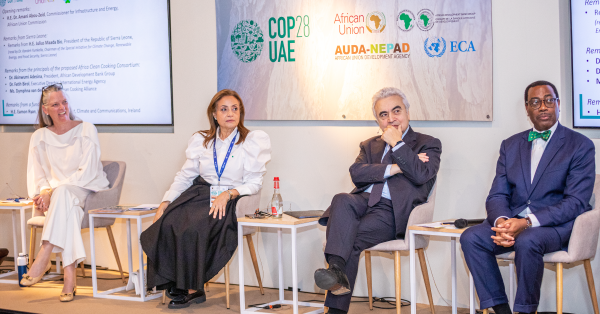The Executive Director of the International Energy Agency (IEA), Fatih Birol, has emphasized the critical need for USD 4.0 billion in annual investments to provide 250 million people with clean cooking solutions at the on-going COP 28 Conference in Dubai.
. Birol underscored that without addressing this issue, global decarbonization efforts would lose meaning.
The President of the African Development Bank Group, Dr. Akinwumi Adesina, announced significant commitments, allocating up to 20 percent of annual lending toward clean cooking and urging governments and development banks to prioritize funding.
“Providing access to clean cooking is clearly doable in Africa. Let us prioritize saving the lives of women and children; let us make it easier for women to cook with dignity and safety. Clean cooking will save forests, the climate, and the lives of women and children,” Adesina added.
The event also witnessed the unveiling of the Africa Clean Cooking Consortium, uniting governments, private sector, and international bodies to accelerate universal access to clean cooking solutions, signaling a collective resolve to address this pressing humanitarian and environmental challenge.
The urgent call for action at COP28 brought together global leaders, including the African Union Commission, Ireland, and private sector representatives, emphasizing the need for collaborative efforts to tackle this issue. Adesina stressed the need to ensure accessibility and affordability in the development of clean cooking infrastructure, pushing for a transformative change that not only safeguards health but also mitigates environmental impact.
The stark realities of high mortality rates, economic losses, and environmental degradation due to the lack of clean cooking underline the pressing need for immediate action. African governments, including Kenya and Sierra Leone, have taken strides by establishing dedicated units and programs to accelerate clean cooking access, signaling a growing commitment to this cause.
The commitment made by the African Development Bank stands as a pivotal move, pledging USD 2.0 billion over the next decade toward clean cooking solutions. This commitment not only signifies a financial investment but also reflects a moral obligation to uplift communities and preserve the environment.
Additionally, the announcement of the African Women Clean Cooking Support Programme in Tanzania further solidifies Africa’s determination to empower women and protect their health by promoting access to clean cooking solutions.
The unfolding developments at COP28 underscore a united front among African nations and their global partners to address the clean cooking crisis. Ireland’s Minister for Climate, Eamon Ryan, commended Africa’s efforts and called upon developed nations to honor their commitments to support developing countries.
The collective resolve exhibited by African leaders and their growing prioritization of clean cooking initiatives mark a pivotal moment in addressing a long-standing humanitarian and environmental challenge.












